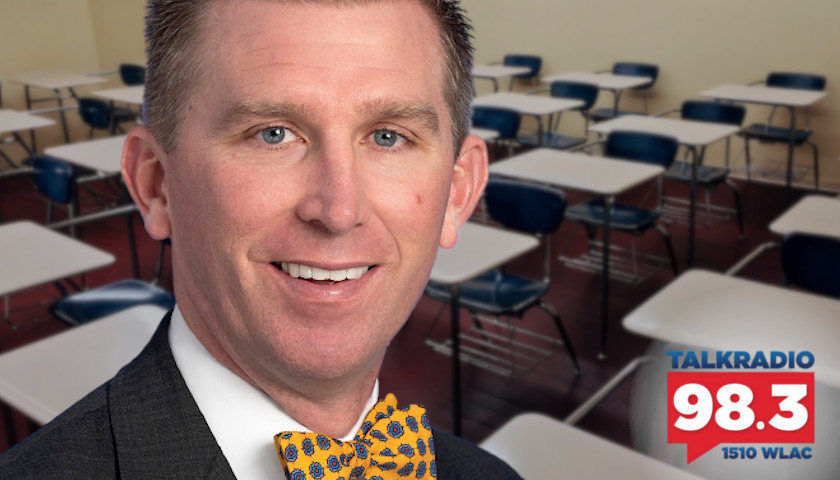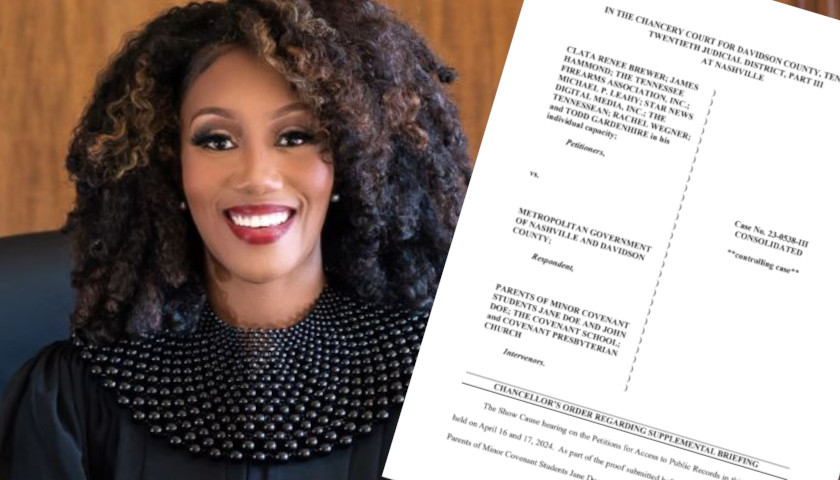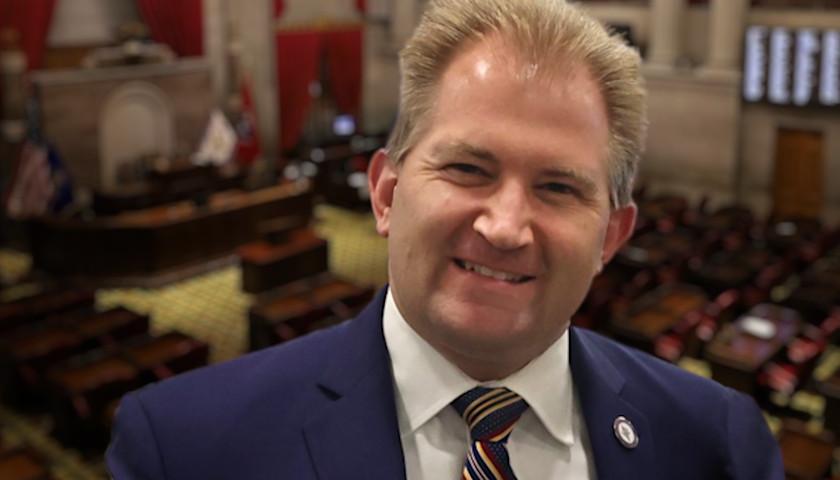Live from Music Row Wednesday morning on The Tennessee Star Report with Michael Patrick Leahy – broadcast on Nashville’s Talk Radio 98.3 and 1510 WLAC weekdays from 5:00 a.m. to 8:00 a.m. – host Leahy welcomed State Rep. Ryan Williams to the newsmakers line to discuss the General Assembly special session and the issues surround literacy in Tennessee.
Leahy: We are joined on the early bird newsmaker line by State Representative Ryan Williams who is Chairman of the very important Finance Committee. Welcome, Representative Williams.
Williams: Thank you. My pleasure to be on the radio with you this morning.
Leahy: You have had a busy day. You had a special session yesterday on education. Up early here this morning. This must come from your discipline as a soccer-playing college scholarship winner in your days at Carson-Newman.
Williams: Oh, wow, you’ve done a little bit of research there. But that was more than two decades ago. (Leahy laughs) I appreciate that anyway.
Leahy: I know what you are talking about. (Chuckles)
Williams: It’s ridiculous, but it’s good.
Leahy: Well, so yesterday, here’s the big news just to get your reaction to it. It’s been portrayed that the governor’s message yesterday was seen as calling out a couple of school districts that are not meeting in person. One, in particular, was Shelby County. The director of schools in Shelby County took offense and put a big statement out basically pushing back against the privilege podium of state leaders that are talking about going back to school in person. Any comments on that?
Williams: Well as you may or may not know the preferential order differentiated treatment Shelby County has always been a challenge for the legislature in this case the governor. But without a doubt, Shelby County has stayed virtual most of this pandemic, and of course, in my district are schools were leading in trying to get kids back into the school. When testing rolls around and we look at what’s over the pandemic as it relates to kids, I think we’re going to find out which solution was better.
Leahy: And of course Shelby County Schools have been traditionally either the worst or second-worst performing in the state for many many years. Obviously, there have been huge problems down there. The Superintendent Dr. Joris M. Ray put out a very aggressive push back on this. And so there’s a bit of a fight brewing between Shelby County Schools and the governor it appears.
Williams: Yes. As I said, it’s nothing new. I think the big challenge that the governor really was saying is the science really says that the kids need to be back in school not only for their health but their mental health. And that the science is saying that they’re pretty well insulated from any challenges as it relates to COVID-19 or the Chinese virus.
Leahy: Yeah, exactly. All of the studies that I’ve seen, I’m not a scientist and I don’t play one on the radio, but I read the reports and that’s what all the reports say. That it’s really not the same kind of health challenge for young kids as it is for old folks like me who are 65 years of age and people even older than me. What do you see Chairman Williams as the big accomplishments ahead in this special session?
Williams: Well, the governor has presented his legislative package. Had three bills. One has to do with literacy as it relates to how as you may or may not know, 37 percent of kids read on grade level by the third grade of all Tennessee kids. So that’s obviously a statistic we’re not very proud of. That’s only been complicated by COVID and our kids’ inability to be in the classroom and to be reading. And one of the bills going to be focused really on how can we improve literacy?
And in some areas it’s going to be a return to the old as you know, the older you get the more real more you realize that what your parents were doing was probably the best way to do it. So it’s kind of a return in most ways to phonics type or fundamental reading method. As you know there are some school systems that walked away from. There’s another bill that has to do with accountability.
As you know, over the last several years have had issues with testing and curriculum and textbooks and things like that. But this other bill has to do with going ahead and proceeding with assessments with students to make sure that we know how they’re proceeding or are how they’re not depending on how they’re doing. But it still holds the school systems and teachers harmless as it relates to the data.
But the importance is we need to test students to see where they are and see how we can get a remediation plan to try to get them back to where they need to be. And then the last one is a bill which is the biggest funding component. I guess you could say is the governor is going to establish remediation camps and provide additional funding to schools so they can find creative ways to get kids plugged in as it relates to education for kids K-8.
And these camps would be regarding English, math, science, engineering arts, or stem centers. So those are the three main bills that the governor’s legislative package. There are going to be several other bills that I’m sure that we’ll take up. But those are the three that he and his staff have come up with.
Leahy: Do you anticipate that all three bills of those bills will pass in this secession in both Houses?
Williams: Yes, I suspect they will. I think most conservatives like myself are excited to see its return back to a phonics way of reading. I know that Speaker Sexton has been very passionate over the last several years about improving literacy among third graders. And so I think that that one’s really important. I think the accountability piece is pretty interesting because they’re the language has I met with the governor’s staff last week, the language allows for teachers to have more flexibility as it relates to testing than they’ve had in a while.
And so I think most legislators are going to be very supportive of it. And then the last one really is just trying to utilize some revenues that we got from the federal government to try to shore up the learning process in Tennessee. I think those are going to be moved through pretty quickly. There obviously are going to be tweaked along the way as we find out more and dig into it deeper in the committee process.
Leahy: I’m going to make a suggestion to you, chairman Williams, that I make to every member of the state legislature when they come in and talk either on-air or in private. I’m going to suggest that you stop by and take a visit to a school here in the Nashville area in Franklin actually that that focuses on the use of a particular methodology for teaching reading and writing, and mathematics to kids K thru five called “Direct Instruction.”
Direct Instruction is sort of like the next level of phonics. And these are friends of ours. I don’t know if you’re familiar with that – Direct Instruction. You may have heard of the school. It’s called Thales Academy. They’re based in Franklin. A very, very good private school. And they’ve had been around in North Carolina for about eight years. They have got eight schools in North Carolina – but they have come here to Nashville, and we’ve looked at it. We think it’s very very effective and we’d like you to consider taking a look at the school and seeing that methodology and perhaps considering introducing it to the public schools here in Tennessee.
Williams: Well I’d be happy to go by and take a look at it. My kids in their youth or younger ages were part of a classical method. Is it similar to that?
Leahy: Exactly. It’s very interesting. Did your kids go to a Classical Christian School?
Williams: They did till the eighth grade and then we plugged them into the world.
Leahy: Exactly. Well, of course, as you know, the classical style of education goes through three phases grammar logic, and rhetoric. and the first phase of grammar is when you learn reading and writing and arithmetic. The methodology of direct instruction has been around as you may be familiar with since the 1960s. Very, very effective and it does that grammar stuff. I just recommend you go and visit them. I think you’ll find it very, very interesting.
Williams: Yeah, I would happy too. I will look them up there in Franklin.
Leahy: Well, thanks for that. I really appreciate it. The other thing I wanted to talk to you about a little bit is the General Session and the legacy and the responsibilities that you have and as being chairman of the finance committee. now people may not be familiar with it. But Tennessee has one of the best credit ratings of any state in the union and a lot of it has to do with the legacy of former representative Charles Sargent and others. The finance committee in the House plays a key role and you’re the chairman.
Williams: Well, I’m the chairman of one of the subcommittees, but you’re exactly right. The last eight of the last ten years were led by Charles Sargent who is a really good friend of mine and his wife Nancy are fantastic people. And so hello Nancy if she’s listening. But, yes, Tennessee is one of the best – if not the best – in the nation as it relates to taxation and stewardship of resources, which is why we’ve got a one-point one billion dollars in the bank right now and another one point seven million dollars in rainy day fund because we’re managing our resources really well, even in a pandemic.
Listen to the full first hour:
– – –
Tune in weekdays from 5:00 – 8:00 a.m. to the Tennessee Star Report with Michael Patrick Leahy on Talk Radio 98.3 FM WLAC 1510. Listen online at iHeart Radio.








